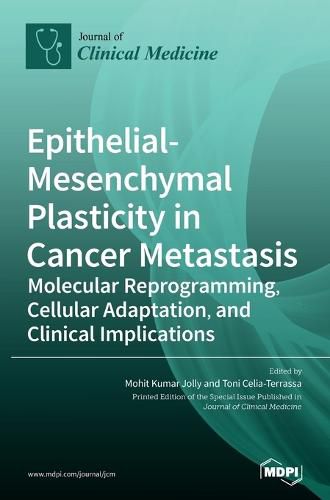Readings Newsletter
Become a Readings Member to make your shopping experience even easier.
Sign in or sign up for free!
You’re not far away from qualifying for FREE standard shipping within Australia
You’ve qualified for FREE standard shipping within Australia
The cart is loading…






This title is printed to order. This book may have been self-published. If so, we cannot guarantee the quality of the content. In the main most books will have gone through the editing process however some may not. We therefore suggest that you be aware of this before ordering this book. If in doubt check either the author or publisher’s details as we are unable to accept any returns unless they are faulty. Please contact us if you have any questions.
Recent studies have highlighted that epithelial-mesenchymal transition (EMT) is not only about cell migration and invasion, but it can also govern many other important elements such as immunosuppression, metabolic reprogramming, senescence-associated secretory phenotype (SASP), stem cell properties, therapy resistance, and tumor microenvironment interactions. With the on-going debate about the requirement of EMT for cancer metastasis, an emerging focus on intermediate states of EMT and its reverse process mesenchymal-epithelial transition (MET) offer new ideas for metastatic requirements and the dynamics of EMT/MET during the entire metastatic cascade. Therefore, we would like to initiate discussions on viewing EMT and its downstream signaling networks as a fulcrum of cellular plasticity, and a facilitator of the adaptive responses of cancer cells to distant organ microenvironments and various therapeutic assaults. We hereby invite scientists who have prominently contributed to this field, and whose valuable insights have led to the appreciation of epithelial-mesenchymal plasticity as a more comprehensive mediator of the adaptive response of cancer cells, with huge implications in metastasis, drug resistance, tumor relapse, and patient survival.
$9.00 standard shipping within Australia
FREE standard shipping within Australia for orders over $100.00
Express & International shipping calculated at checkout
This title is printed to order. This book may have been self-published. If so, we cannot guarantee the quality of the content. In the main most books will have gone through the editing process however some may not. We therefore suggest that you be aware of this before ordering this book. If in doubt check either the author or publisher’s details as we are unable to accept any returns unless they are faulty. Please contact us if you have any questions.
Recent studies have highlighted that epithelial-mesenchymal transition (EMT) is not only about cell migration and invasion, but it can also govern many other important elements such as immunosuppression, metabolic reprogramming, senescence-associated secretory phenotype (SASP), stem cell properties, therapy resistance, and tumor microenvironment interactions. With the on-going debate about the requirement of EMT for cancer metastasis, an emerging focus on intermediate states of EMT and its reverse process mesenchymal-epithelial transition (MET) offer new ideas for metastatic requirements and the dynamics of EMT/MET during the entire metastatic cascade. Therefore, we would like to initiate discussions on viewing EMT and its downstream signaling networks as a fulcrum of cellular plasticity, and a facilitator of the adaptive responses of cancer cells to distant organ microenvironments and various therapeutic assaults. We hereby invite scientists who have prominently contributed to this field, and whose valuable insights have led to the appreciation of epithelial-mesenchymal plasticity as a more comprehensive mediator of the adaptive response of cancer cells, with huge implications in metastasis, drug resistance, tumor relapse, and patient survival.